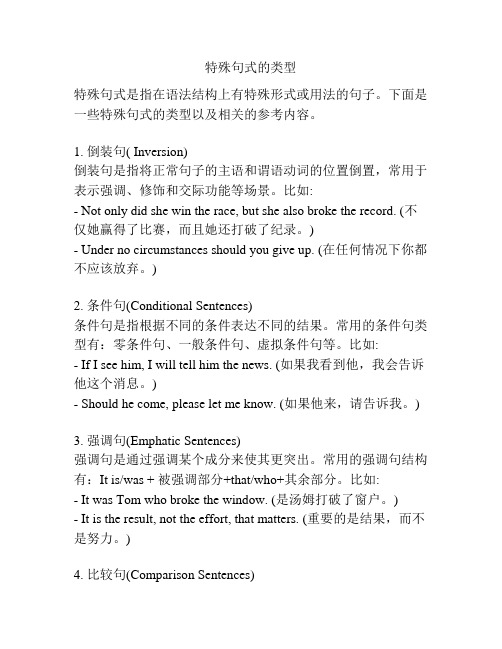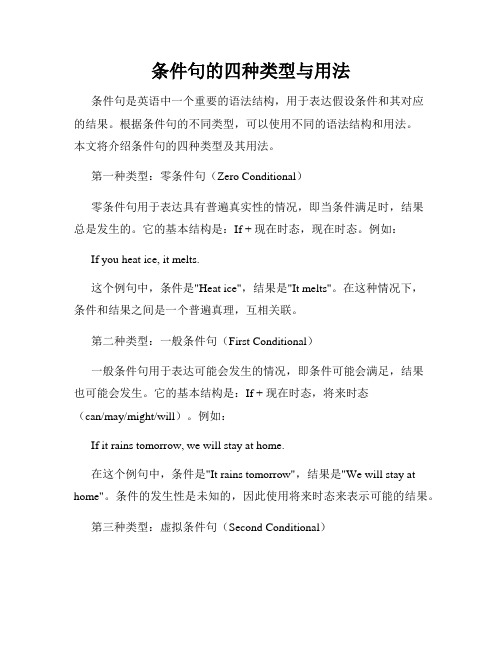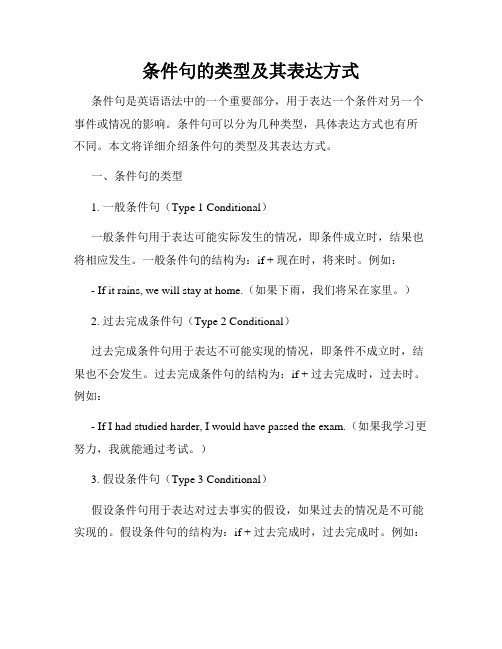语法课 条件句 Conditional
特殊句式的类型

特殊句式的类型特殊句式是指在语法结构上有特殊形式或用法的句子。
下面是一些特殊句式的类型以及相关的参考内容。
1. 倒装句( Inversion)倒装句是指将正常句子的主语和谓语动词的位置倒置,常用于表示强调、修饰和交际功能等场景。
比如:- Not only did she win the race, but she also broke the record. (不仅她赢得了比赛,而且她还打破了纪录。
)- Under no circumstances should you give up. (在任何情况下你都不应该放弃。
)2. 条件句(Conditional Sentences)条件句是指根据不同的条件表达不同的结果。
常用的条件句类型有:零条件句、一般条件句、虚拟条件句等。
比如:- If I see him, I will tell him the news. (如果我看到他,我会告诉他这个消息。
)- Should he come, please let me know. (如果他来,请告诉我。
)3. 强调句(Emphatic Sentences)强调句是通过强调某个成分来使其更突出。
常用的强调句结构有:It is/was + 被强调部分+that/who+其余部分。
比如:- It was Tom who broke the window. (是汤姆打破了窗户。
)- It is the result, not the effort, that matters. (重要的是结果,而不是努力。
)4. 比较句(Comparison Sentences)比较句是用来比较两个对象或者描述相对关系的句子。
常用的比较句结构有:as+adj./adv. +as, not as+adj./adv.+as,more/less+adj./adv.+ than等。
比如:- He runs as fast as a cheetah. (他跑得像一只猎豹一样快。
条件句的种类与用法

条件句的种类与用法条件句是英语中非常常见的一种句型,用来表达假设、条件或者对未来可能发生的情况进行推测。
根据条件句的不同形式以及所表达的意义,可以分为四种基本类型:零条件句、一般条件句、虚拟条件句和倒装条件句。
以下将详细介绍每种类型的条件句及其用法。
一、零条件句(Zero Conditional)零条件句是用来表达普遍真理、科学定律或者客观事实时使用的条件句。
它的形式是:if + 现在时态,现在时态。
例句如下:1. If you heat ice, it melts.(你加热冰,它会融化。
)2. If it rains, the ground gets wet.(如果下雨,地面会变湿。
)二、一般条件句(First Conditional)一般条件句是用来表达可能发生的情况或者对将来的情况进行预测时使用的条件句。
它的形式是:if + 现在时态,将来时态。
例句如下:1. If I study hard, I will pass the exam.(如果我学习努力,我会通过考试。
)2. If it doesn't rain, we will go for a picnic.(如果不下雨,我们将去野餐。
)三、虚拟条件句(Second Conditional)虚拟条件句是用来表达假设的情况,或者对过去的情况进行虚拟推测时使用的条件句。
它的形式是:if + 过去时态,虚拟语气。
例句如下:1. If I were rich, I would travel around the world.(如果我有钱,我会周游世界。
)2. If I had studied harder, I would have passed the exam.(如果我当时学得更努力,我就能通过考试了。
)四、倒装条件句(Third Conditional)倒装条件句是用来表达与过去事实相反的假设情况时使用的条件句。
它的形式是:should/ were + 主语,过去完成时态。
条件句的四种类型与用法

条件句的四种类型与用法条件句是英语中一个重要的语法结构,用于表达假设条件和其对应的结果。
根据条件句的不同类型,可以使用不同的语法结构和用法。
本文将介绍条件句的四种类型及其用法。
第一种类型:零条件句(Zero Conditional)零条件句用于表达具有普遍真实性的情况,即当条件满足时,结果总是发生的。
它的基本结构是:If + 现在时态,现在时态。
例如:If you heat ice, it melts.这个例句中,条件是"Heat ice",结果是"It melts"。
在这种情况下,条件和结果之间是一个普遍真理,互相关联。
第二种类型:一般条件句(First Conditional)一般条件句用于表达可能会发生的情况,即条件可能会满足,结果也可能会发生。
它的基本结构是:If + 现在时态,将来时态(can/may/might/will)。
例如:If it rains tomorrow, we will stay at home.在这个例句中,条件是"It rains tomorrow",结果是"We will stay at home"。
条件的发生性是未知的,因此使用将来时态来表示可能的结果。
第三种类型:虚拟条件句(Second Conditional)虚拟条件句用于表达假设的情况,即条件与现实相反,结果是不可能或不太可能发生的。
它的基本结构是:If + 过去时态(动词的过去式),would/could/might + 动词原形。
例如:If I won the lottery, I would travel the world.在这个例句中,条件是"I won the lottery",然而,我们知道这个情况几乎不可能实现,因此使用虚拟条件句来表示假设情况和相应结果。
第四种类型:混合条件句(Mixed Conditional)混合条件句用于表达过去发生的假设情况对现在或未来的影响。
语法课-条件句--Conditional

第四种类型:与过去事实相反的非真实条件句
基本形式:(If) had + -ed 分词 + (Main) would (could, might, etc) have + -ed 分词 Eg: We would / could / might have called you if we had known your telephone number. If we had caught that plane, we could have been taking part in the celebrations.
条件句 Conditional
条件句的结构:条件状语分句+主句
第一种类型:真实条件句 Real Conditional
1.表示普遍真理和客观事实 Eg: If you heat ice, it melts.
If you pour oil on water, it floats. 由上述诸例可以看出,凡表示不受时间限制的自然法则的条件句,其从句和主
如果不是闰年(leap year),二月份有多少天? How many days are there in February if it is not a leap year? 如果这没有许多蚊子,晚会就十全十美了。 If there weren’t so many mosquitoes, it would be a perfect
在时: (If) simple present +(Main) simple present 3.表示过去习惯动作
Eg: If I was hungry, I usually had a full meal.
If I made a promise, I kept it. 在上述表示过去习惯动作的条件句中,从句和主句的谓语动词都用一般过去时:
Grammar Conditional

2. Will you go out with me on Saturday night if you finish the project?
3. If you go to that website, you’ll find some interesting information.
2) If you had got up earlier, you could have caught the train.
如果你早一点起床,就会赶上火车的。
与过去相反的句型
条件从句
条件从句的谓语形式 主句的谓语形式
与过去相反
If I (you, he/she, they, should/would/could/ we )+had +过去分词 might+have+过去分
3. Second Conditional第二条件句,又称“虚拟 条件句,非真实条件句”。②表示现在不可 能存在的状态。(亦称为对现在的虚拟。)
1)If I were you, I would try it again. 如果我是你,我会再试一次。
2)If I had one million dollars, I ,我会买下这架飞机。
2) If he were to come here tomorrow, I would tell him.
3) If he should fail in the experiment this time, he would try again.
与将来相反的句型
条件从句 条件从句的谓语形式
主语的谓语形式
If you made a noise, the library worker would ask you to go out.
条件句的类型及其表达方式

条件句的类型及其表达方式条件句是英语语法中的一个重要部分,用于表达一个条件对另一个事件或情况的影响。
条件句可以分为几种类型,具体表达方式也有所不同。
本文将详细介绍条件句的类型及其表达方式。
一、条件句的类型1. 一般条件句(Type 1 Conditional)一般条件句用于表达可能实际发生的情况,即条件成立时,结果也将相应发生。
一般条件句的结构为:if + 现在时,将来时。
例如:- If it rains, we will stay at home.(如果下雨,我们将呆在家里。
)2. 过去完成条件句(Type 2 Conditional)过去完成条件句用于表达不可能实现的情况,即条件不成立时,结果也不会发生。
过去完成条件句的结构为:if + 过去完成时,过去时。
例如:- If I had studied harder, I would have passed the exam.(如果我学习更努力,我就能通过考试。
)3. 假设条件句(Type 3 Conditional)假设条件句用于表达对过去事实的假设,如果过去的情况是不可能实现的。
假设条件句的结构为:if + 过去完成时,过去完成时。
例如:- If I had known you were coming, I would have prepared dinner.(如果我早知道你要来,我就会准备晚餐了。
)4. 零条件句(Zero Conditional)零条件句用于表达普遍真实的情况,即无论何时条件成立,结果都会相应发生。
零条件句的结构为:if + 现在时,现在时。
例如:- If you heat ice, it melts.(如果加热冰块,它会融化。
)二、条件句的表达方式1. 使用 if 引导条件句中的条件部分通常由 if 引导,表达方式简洁明了。
2. 使用 unless 替代 if not除了 if,条件句中条件部分也可以使用 unless 来表示否定意义,相当于 if not。
英语语法句子种类

英语语法句子种类
英语语法中常见的句子种类包括:
1. 陈述句(declarative sentence):陈述句是表达一个声明、陈述或描述的句子,通常以句号结尾。
例:I like to read books.(我喜欢阅读书籍。
)
2. 疑问句(interrogative sentence):疑问句用于提出问题,通常以问号结尾。
例:Do you like ice cream?(你喜欢冰淇淋吗?)
3. 感叹句(exclamatory sentence):感叹句用于表达强烈的感情或情绪,通常以感叹号结尾。
例:What a beautiful sunset!(多么美丽的日落啊!)
4. 祈使句(imperative sentence):祈使句用于表达请求、命令、建议或要求,通常省略了主语,动词在前。
例:Please close the window.(请关上窗户。
)
5. 条件句(conditional sentence):条件句用于表达假设、条件或推断,并包含主从句。
例:If it rains, we will stay indoors.(如果下雨,我们就会呆在室内。
)
例:I like to read books, and he prefers to watch movies.(我喜欢阅读书籍,他更喜欢看电影。
)
例:She is studying English because she wants to improve her job prospects.(她正在学习英语,因为她想提高工作前景。
)以上是英语语法中常见的句子种类,每种句子种类都有其特定的用途和结构。
英语语法句子种类与类型

英语语法句子种类与类型
英语语法中的句子种类主要有以下几种:
1. 陈述句(declarative sentence):用于陈述一个事实、观点、
情况等,以陈述句调子末尾的句点表示。
例:She is studying English.
2. 疑问句(interrogative sentence):用于提出问题,以问号结尾。
例:Is she studying English?
3. 命令句(imperative sentence):用于表达命令或请求,常以动
词原形开头。
例:Please study for your test.
4. 感叹句(exclamatory sentence):用于表达强烈的感情或感叹,以感叹号结尾。
例:What a beautiful sunset!
此外,还有一些特殊类型的句子,如:
1. 条件句(conditional sentence):用于表达假设、条件等情况,包括主从句结构。
例:If it rains, we will stay at home.
例:I like to read books, and my brother likes to watch movies.
3. 从句(subordinate clause):作为主句的一部分,常用连接词引导,包括定语从句、名词性从句和状语从句等。
例:The book that I bought yesterday is very interesting.。
- 1、下载文档前请自行甄别文档内容的完整性,平台不提供额外的编辑、内容补充、找答案等附加服务。
- 2、"仅部分预览"的文档,不可在线预览部分如存在完整性等问题,可反馈申请退款(可完整预览的文档不适用该条件!)。
- 3、如文档侵犯您的权益,请联系客服反馈,我们会尽快为您处理(人工客服工作时间:9:00-18:30)。
第三种类型: 第三种类型:非真实条件句 Unreal Conditional
基本形式: (If) simple past / were + (Main) would, etc + inf Eg: If we caught the 10 o’clock train, we would (could, might, etc) get there by lunchtime.
第四种类型: 第四种类型:与过去事实相反的非真实条件句
基本形式:(If) had + -ed 分词 + (Main) would (could, might, etc) have + -ed 分词 Eg: We would / could / might have called you if we had known your telephone number. If we had caught that plane, we could have been taking part in the celebrations. 第三种类型与第四种类型的条件句的动词形式有相对的固定性,若要混合使用,则要注意 句子的逻辑性。比如可以说: If you had told me to, I would have paid him. 却不可以说:If you told me to, I would have paid him.
第二种类型: 第二种类型:真实条件语句的主体 这种句式可分为:“基本形式” (Basic Form),“变体形 式”(Variant Form)和“替换形式”(Alternative Form)
1.基本形式 基本形式(Basic Form) 基本形式
Eg: If it is fine tomorrow, we can have a picnic somewhere. If you wake up before me, give me a call. 从上述诸例可以看出,这一类型条件语句有两个基本形式: 一是从句用一般现在时表示将来时间,主语用shall / will / can / may 等+不定式: (If) simple present + (Main) shall / will ,etc + inf 二是从句用一般现在时表示将来时间,主句用动词祈使式: (If) simple present + (Main) imperative
条件句 Conditional
条件句的结构:条件状语分句+主句
第一种类型: 第一种类型:真实条件句 Real Conditional
1.表示普遍真理和客观事实 Eg: If you heat ice, it melts. If you pour oil on water, it floats. 由上述诸例可以看出,凡表示不受时间限制的自然法则的条件句,其从句和主 句的谓语动词都用一般现在时: (If) simple present +(Main) simple present 2.表示现在习惯的动作 Eg: If I make a promise, I keep it. If it rains, I go to work by car. 在上述表示现在习惯动作的条件句中,从句和主句的谓语动词也都是用一般现 在时: (If) simple present +(Main) simple present 3.表示过去习惯动作 Eg: If I was hungry, I usually had a full meal. If I made a promise, I kept it. 在上述表示过去习惯动作的条件句中,从句和主句的谓语动词都用一般过去时: (If) simple past +(Main) simple past
第二种类型: 第二种类型:真实条件语句的主体
③在if-分句中用 would ,有表示“意愿”的意思,常用语客气的请求,这时, 主句动词既可以用 will / shall + 不定式, 也可用 would / should / could / might + 不定式 Eg: If you would kindly wait a moment, I’ll see what I can do. If you would try Italian food, you would like it. 如果表示“意愿”的would不是用于客气的请求,那么,在一定上下文中也可能 表示不大可能实现的“意愿”,这就属于非真实条件句,即第三种类型的条 件句的一种变体形式。 3. 替换形式 替换形式(Alternative Form) Set your alarm clock, and you won’t oversleep. = If you set your alarm clock, you won’t oversleep. Set your alarm clock, or (else) you’ll oversleep. =If you don’t set your alarm clock, you’ll oversleep.
Exercise
1.The volleyball match will be put off if it _ . A. will rain B. rains C. rained D. is rained. 2. Were it not for the snowy weather, we __________all right. A. would be B. would have been C. were D. may be 3.________more careful, his ship would not have sunk. A.If the captain were B. Had the captain been C. Should the captain be D. If the captain would have been 4. _____________today, he would get there by Friday. A.Would he leave B. Was he leaving C. Were he to leave D. If he leaves 5. ________ she ________ yesterday, she would meet the famous singer today. A. If, didn’t leave B. Had not, left C. Hadn’t, left D. Didn’t, leave
if-分句说表示的条件在说话人看来实现的可能性不大,但还是有可能的,比如说话时间已经是九点 多钟,尚未动身,因而不大可能赶上十点钟的火车,也不大可能在吃午饭以前到达。
If I came into a fortune, I would give up working.
if-分句表示的条件came into fortune 显然是一种主观臆想,几乎不可能实现。
这个句子的前半段(即从句)是第三种类型的条件句表示现在不大可能实现的条件,而后半段(即主句) 却表示与过去事实相反的情况,前后在逻辑意义上不相协调。但是在保证句子合乎逻辑的前提下, 也可根据语义意图混合使用两种句型的动词形式。
Eg: If writing had never been invented, we would have had no books. If writing had never been invented, we would have no books. 变体形式: (If) were to have + -ed 分词 + (Main) would (could, might, etc) have + ed 分词 Eg: If you were to have asked me, I would have been only too willing to help. If you were to have explained your problem to me, I would have been able to help you.
Exercise
如果不是闰年( year),二月份有多少天? ),二月份有多少天 如果不是闰年(leap year),二月份有多少天? How many days are there in February if it is not a leap year? 如果这没有许多蚊子,晚会就十全十美了。 如果这没有许多蚊子,晚会就十全十美了。 weren’ If there weren’t so many mosquitoes, it would be a perfect evening. 如果你处于我的地位,你会怎么处理这个问题? 如果你处于我的地位,你会怎么处理这个问题? What would you do about the problem if you were in my shoes? 如果商店把货物包扎好,这些货物就不会损毁了。 如果商店把货物包扎好,这些货物就不会损毁了。 wouldn’ If the shop had packed the goods properly, they wouldn’t have got damaged. 如果当初你采纳我的劝告,你现在就不会陷入这样的困境。 如果当初你采纳我的劝告,你现在就不会陷入这样的困境。 If you had taken my advice, you would not be in a difficult position now.
第二种类型: 第二种类型:真实条件语句的主体 2.变体形式 变体形式(Variant Form) 变体形式
这种形式又有三种分类 ①从句动词不管主语的人称和数如何,一律用 意图采用不同形式。 Eg: If it should rain again, the flowers will bloom. If I should be detained, start the program without me. 在这里,should 仅表示一种不太肯定的婉转口气,并不影响条件的真实性。 ②在if-分句中用“will + 不定式”并不单纯表示将来意义,这里的 will 是个表 示“意愿”的情态助动词,相当于 be willing to Eg: If you will reserve seats, we shall be sure of a comfortable journey. If he will accept the nomination(提名), a lot of electors will vote for him. 要知道这种带“will + 不定式”的if-分句在某些场合是不可以随便用的,比如我 们可以说:If he gets my letter in time, he’ll be able to change his plans. 却不可以说:If he will get me letter in time, he’ll be…
